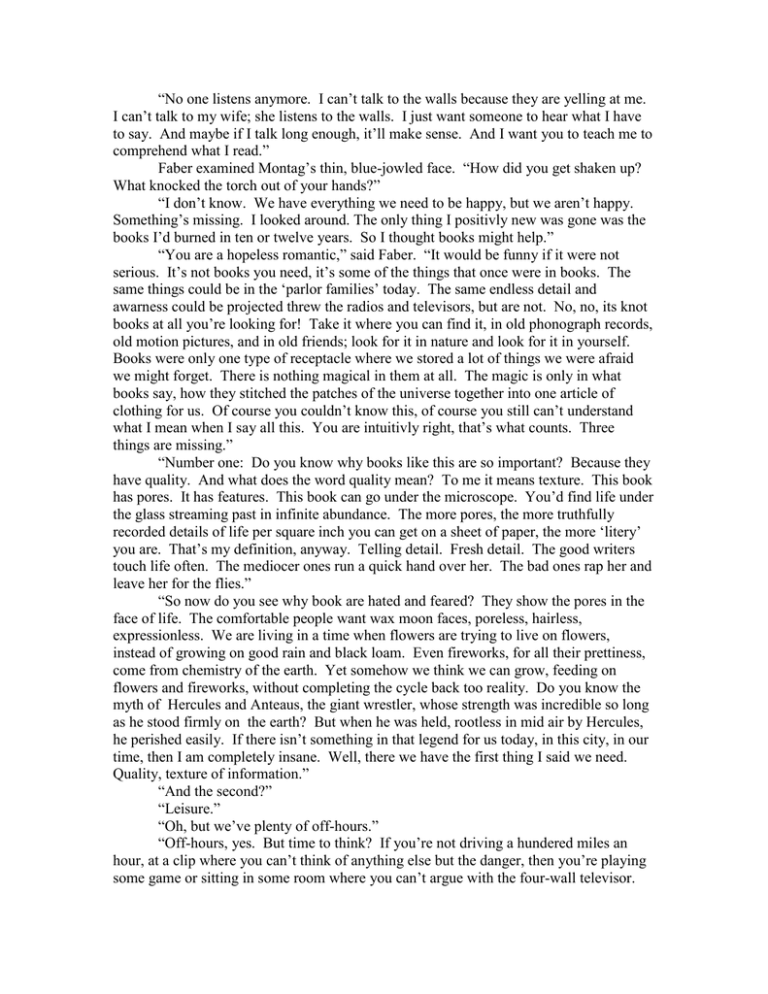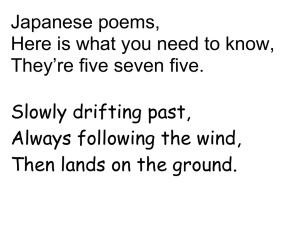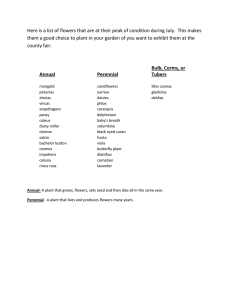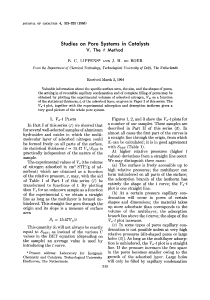“No one listens anymore. I can’t talk to the... I can’t talk to my wife; she listens to the...
advertisement

“No one listens anymore. I can’t talk to the walls because they are yelling at me. I can’t talk to my wife; she listens to the walls. I just want someone to hear what I have to say. And maybe if I talk long enough, it’ll make sense. And I want you to teach me to comprehend what I read.” Faber examined Montag’s thin, blue-jowled face. “How did you get shaken up? What knocked the torch out of your hands?” “I don’t know. We have everything we need to be happy, but we aren’t happy. Something’s missing. I looked around. The only thing I positivly new was gone was the books I’d burned in ten or twelve years. So I thought books might help.” “You are a hopeless romantic,” said Faber. “It would be funny if it were not serious. It’s not books you need, it’s some of the things that once were in books. The same things could be in the ‘parlor families’ today. The same endless detail and awarness could be projected threw the radios and televisors, but are not. No, no, its knot books at all you’re looking for! Take it where you can find it, in old phonograph records, old motion pictures, and in old friends; look for it in nature and look for it in yourself. Books were only one type of receptacle where we stored a lot of things we were afraid we might forget. There is nothing magical in them at all. The magic is only in what books say, how they stitched the patches of the universe together into one article of clothing for us. Of course you couldn’t know this, of course you still can’t understand what I mean when I say all this. You are intuitivly right, that’s what counts. Three things are missing.” “Number one: Do you know why books like this are so important? Because they have quality. And what does the word quality mean? To me it means texture. This book has pores. It has features. This book can go under the microscope. You’d find life under the glass streaming past in infinite abundance. The more pores, the more truthfully recorded details of life per square inch you can get on a sheet of paper, the more ‘litery’ you are. That’s my definition, anyway. Telling detail. Fresh detail. The good writers touch life often. The mediocer ones run a quick hand over her. The bad ones rap her and leave her for the flies.” “So now do you see why book are hated and feared? They show the pores in the face of life. The comfortable people want wax moon faces, poreless, hairless, expressionless. We are living in a time when flowers are trying to live on flowers, instead of growing on good rain and black loam. Even fireworks, for all their prettiness, come from chemistry of the earth. Yet somehow we think we can grow, feeding on flowers and fireworks, without completing the cycle back too reality. Do you know the myth of Hercules and Anteaus, the giant wrestler, whose strength was incredible so long as he stood firmly on the earth? But when he was held, rootless in mid air by Hercules, he perished easily. If there isn’t something in that legend for us today, in this city, in our time, then I am completely insane. Well, there we have the first thing I said we need. Quality, texture of information.” “And the second?” “Leisure.” “Oh, but we’ve plenty of off-hours.” “Off-hours, yes. But time to think? If you’re not driving a hundered miles an hour, at a clip where you can’t think of anything else but the danger, then you’re playing some game or sitting in some room where you can’t argue with the four-wall televisor. Why? The televisor is ‘real.’ It is imediate, it has dimension. It tells you what to think and blasts it in. It must be right. It seems so right. It rushes you on so rapidly to its own conclusions you mind hasn’t time to protest, ‘What nonsense!” Citation: Bradbury, Ray. Fahrenheit 451. Ballantine Books. 1991.



